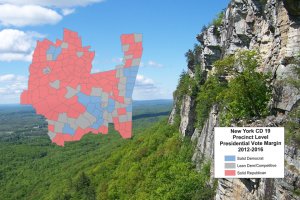West Long Branch, NJ – First-term Congressman John Faso is in a tight race with attorney and former hip-hop performer Antonio Delgado in New York’s 19th Congressional District, according to the latest Monmouth University Poll. The Democratic challenger has slightly better personal ratings than the Republican incumbent, despite charges that Delgado is a carpetbagger and recent revelations about provocative rap lyrics during his music career. While both candidates have base areas of support, the fight to persuade voters looks to be concentrated in the part of the district located east of the Hudson River.
Delgado is supported by 45% and Faso is supported by 43% of all potential voters – that is voters who have participated in an election since 2010 or have newly registered to vote (a group that represents about 81% of all registered voters in the district). Another 9% are undecided. When applying two different likely voter models, the contest continues to favor the Democrat. A historical midterm model gives Delgado a 48% to 45% lead over Faso, while a model that includes a turnout surge in Democratic precincts gives Delgado a 49% to 43% lead. These leads, though, are within the margin of error for all these models.
It does not appear that independent candidates are primed to take a large share of the vote – Green Party nominee Steven Greenfield earns 1% and other candidates get 2%. More than a half dozen left-leaning third party and independent candidates filed to run in this election, although many have been removed from the ballot by the Board of Elections or court order.
“Democrats were worried that a glut of left-leaning third party candidates would hurt Delgado’s chances. That doesn’t seem to be the case right now, but it could be a factor if the race remains tight,” said Patrick Murray, director of the independent Monmouth University Polling Institute.
The race is tightest in the part of the district located east of the Hudson River (Columbia, Dutchess, and Rensselaer counties), with Delgado getting 46% support and Faso getting 45% support there. Delgado performs strongest in the southern part of the district (Sullivan and Ulster counties), with a lead of 51% to 34% over Faso. Faso’s strongest area is the remaining counties that make up the western part of the district, holding a 52% to 36% lead over Delgado.
Currently, 60% of NY-19 voters express a lot of interest in the November election for Congress. This includes 64% of self-identified Democrats and 62% of independents, but a smaller number of Republicans (54%). The enthusiasm gap is even wider when looking at interest by candidate support. While 73% of Delgado voters express a lot of interest in the upcoming election, only 57% of Faso supporters say the same.
Faso receives a divided personal rating of 34% favorable and 33% unfavorable from district voters, with 33% having no opinion of the first-term incumbent. Delgado is not as familiar to voters but earns a net positive rating of 36% favorable and 21% unfavorable, with 43% having no opinion of him. Voters are divided on whether the two candidates are in touch or out of touch with NY-19 residents. Four-in-ten (40%) say Faso is in touch and a similar 41% say he is not. Likewise, 37% say Delgado is touch with the district and 34% say he is not.
“Faso has been trying to paint Delgado as a carpetbagger with a dubious past in rap music. It’s not clear that those attacks have taken hold, at least not enough to give the Republican an advantage,” said Murray.
Overall, 48% of NY-19 voters approve of the job Trump is doing as president while 47% disapprove. However, more voters strongly disapprove (43%) than strongly approve (35%). This gap is especially wide among white voters with a college degree – 59% strongly disapprove to 20% strongly approve. White voters without a college degree give a slight edge to strongly approve (42%) over strongly disapprove (34%). The poll finds that 68% of potential NY-19 voters say it is very important for them to cast a vote for Congress that shows how they feel about the president – including 76% of Trump opponents and 69% of Trump supporters.
Currently, 29% of voters say Faso has been too supportive of the president, while 32% say he has offered the right amount of support and 13% say he has not been supportive enough. Another 25% have no opinion. As a point of comparison, fewer voters (21%) expect that Delgado will be too supportive of House Minority Leader Nancy Pelosi if he is elected to Congress, while 30% say he will offer the right amount of support and 8% say he will offer too little support. A plurality of 41%, though, have no opinion.
Overall, NY-19 voters are divided on whether they would rather see Republicans (39%) or Democrats (37%) in control of Congress. Another 20% say that party control does not matter to them. In the most competitive part of the district east of the Hudson River, Democrats actually have a slight edge (43% to 38%) on the generic party control question. As may be expected, they have an even bigger advantage in the southern part of the district (38% to 29%), while Republican control of Congress is preferred by voters in the western part of the district (53% to 28%).
When asked to choose the top issue in their vote for Congress from a list of six policy areas, 29% pick health care, which is followed by immigration (20%), gun control (15%), tax policy (11%), job creation policy (10%), and abortion (4%). Health care is the most important issue for Delgado voters (44%), while immigration is the top pick for Faso voters (31%). Among voters who are undecided or only leaning toward a candidate right now, health care is the most pressing concern (32%). The poll also finds that NY-19 voters are evenly split on the tax reform plan passed by Congress in December – 40% approve and 41% disapprove.
“Concerns about the stability of health care costs are a factor that favors Delgado, while immigration and gun control policy are issues that help boost Faso’s support,” said Murray.
New York’s 19th is considered a “pivot” district, having voted for Barack Obama for president in 2012 (by 6 points) and for Trump in 2016 (by 7 points). Faso entered the House by winning an open seat two years ago by 8 points.
The Monmouth University Poll was conducted by telephone from September 6 to 10, 2018 with 401 voters in New York’s 19th Congressional District. The question results in this release have a margin of error of +/- 4.9 percentage points for the full sample and +/- 5.4 percentage points for the likely voter models. The error of the gap between the two candidates’ vote share (i.e. the margin of the “lead”) is +/-6.9 percentage points for the full sample and +/- 7.7 percentage points for the likely voter models. The poll was conducted by the Monmouth University Polling Institute in West Long Branch, NJ.
QUESTIONS AND RESULTS
(* Some columns may not add to 100% due to rounding.)
1/2. If the election for U.S. House of Representatives in your district was today, would you vote for John Faso the Republican, Antonio Delgado the Democrat, Steven Greenfield of the Green Party, or some other candidate? [IF UNDECIDED: If you had to vote for one of the following at this moment, do you lean more toward John Faso or more toward Antonio Delgado?] [NAMES WERE ROTATED]
| With leaners | September 2018 | ||
Likely Voter Models | |||
Full voter | Standard | Democratic | |
| John Faso | 43% | 45% | 43% |
| Antonio Delgado | 45% | 48% | 49% |
| Steven Greenfield | 1% | 1% | 1% |
| Other candidate | 2% | 1% | 1% |
| (VOL) Undecided | 9% | 5% | 5% |
| (n) | (401) | (327) | (327) |
[QUESTIONS 3 & 4 WERE ROTATED]
3. Is your general impression of John Faso favorable or unfavorable, or do you have no opinion of him?
| Sept. 2018 | |
| Favorable | 34% |
| Unfavorable | 33% |
| No opinion | 33% |
| (n) | (401) |
4. Is your general impression of Antonio Delgado favorable or unfavorable, or do you have no opinion of him?
| Sept. 2018 | |
| Favorable | 36% |
| Unfavorable | 21% |
| No opinion | 43% |
| (n) | (401) |
5. How much interest do you have in the upcoming election for House of Representatives – a lot of interest, a little interest, or not much interest at all?
| Sept. 2018 | |
| A lot | 60% |
| A little | 26% |
| Not much at all | 14% |
| (VOL) Don’t Know | 0% |
| (n) | (401) |
6. Have you been following the campaign in your congressional district very closely, somewhat closely, or not too closely?
| Sept. 2018 | |
| Very closely | 21% |
| Somewhat closely | 44% |
| Not too closely | 34% |
| (VOL) Don’t Know | 0% |
| (n) | (401) |
7. Do you approve or disapprove of the job Donald Trump is doing as president? [Do you (approve/disapprove) strongly or somewhat?]
| Sept. 2018 | |
| Strongly approve | 35% |
| Somewhat approve | 13% |
| Somewhat disapprove | 4% |
| Strongly disapprove | 43% |
| (VOL) Don’t Know | 5% |
| (n) | (401) |
8. On most issues would you say you support or oppose what President Trump is doing?
| Sept. 2018 | |
| Support | 48% |
| Oppose | 46% |
| (VOL) Depends/both | 4% |
| (VOL) Don’t Know | 2% |
| (n) | (401) |
9. How important is it for you to cast a vote for Congress that shows your [support of/opposition to] President Trump – very important, somewhat important, not too important, or not at all important?
| Sept. 2018 | |
| Very important | 68% |
| Somewhat important | 13% |
| Not too important | 7% |
| Not at all important | 5% |
| (VOL) Don’t Know | 7% |
| (n) | (401) |
10. Would you rather see the Republicans or the Democrats in control of Congress, or doesn’t this matter to you?
| Sept. 2018 | |
| Republicans | 39% |
| Democrats | 37% |
| Does not matter | 20% |
| (VOL) Don’t Know | 4% |
| (n) | (401) |
[QUESTIONS 11 & 12 WERE ROTATED]
11. Has John Faso been too supportive of Donald Trump, not supportive enough, or has he given the right amount of support to Trump?
| Sept. 2018 | |
| Too supportive | 29% |
| Not supportive enough | 13% |
| Right amount of support | 32% |
| (VOL) Don’t Know | 25% |
| (n) | (401) |
12. If Antonio Delgado is elected do you think he will be too supportive of Nancy Pelosi, not supportive enough, or will he offer the right amount of support to Pelosi?
| Sept. 2018 | |
| Too supportive | 21% |
| Not supportive enough | 8% |
| Right amount of support | 30% |
| (VOL) Don’t Know | 41% |
| (n) | (401) |
13. Please tell me which one of the following policy issues is most important to you in your vote choice for Congress. [ITEMS WERE ROTATED]
| Sept. 2018 | |
| Immigration policy | 20% |
| Health care policy | 29% |
| Gun control policy | 15% |
| Abortion policy | 4% |
| Tax policy | 11% |
| Job creation policy | 10% |
| (VOL) Other | 7% |
| (VOL) Don’t know | 3% |
| (n) | (401) |
14. Do you approve or disapprove of the tax reform plan passed by Congress in December? [Do you (approve/disapprove) strongly or somewhat?]
| Sept. 2018 | |
| Strongly approve | 24% |
| Somewhat approve | 16% |
| Somewhat disapprove | 11% |
| Strongly disapprove | 30% |
| (VOL) Don’t Know | 19% |
| (n) | (401) |
[QUESTIONS 15 & 16 WERE ROTATED]
15. Do you think John Faso is in touch or out of touch with the residents of this district?
| Sept. 2018 | |
| In touch | 40% |
| Out of touch | 41% |
| (VOL) Don’t Know | 19% |
| (n) | (401) |
16. Do you think Antonio Delgado is in touch or out of touch with the residents of this district?
| Sept. 2018 | |
| In touch | 37% |
| Out of touch | 34% |
| (VOL) Don’t Know | 29% |
| (n) | (401) |
17. How important is it for you personally to get involved in politics – very important, somewhat important, not too important, or not at all important?
| Sept. 2018 | |
| Very important | 33% |
| Somewhat important | 41% |
| Not too important | 14% |
| Not at all important | 12% |
| (VOL) Don’t know | 1% |
| (n) | (401) |
METHODOLOGY
The Monmouth University Poll was sponsored and conducted by the Monmouth University Polling Institute from September 6 to September 10, 2018 with a random sample of 401 potential voters in New York’s 19th Congressional District, drawn from a list of registered voters who voted in at least one of the last four general or primary elections or have registered to vote since January 2016. This includes 280 contacted by a live interviewer on a landline telephone and 121 contacted by a live interviewer on a cell phone, in English. Monmouth is responsible for all aspects of the survey design, data weighting and analysis. Final sample is weighted for region, party registration, age, gender, education and race based on state voter registration list and U.S. Census information. Data collection support provided by Braun Research (field) and L2 (voter sample). For results based on this sample, one can say with 95% confidence that the error attributable to sampling has a maximum margin of plus or minus 4.9 percentage points (unadjusted for sample design). Sampling error can be larger for sub-groups (see table below). In addition to sampling error, one should bear in mind that question wording and practical difficulties in conducting surveys can introduce error or bias into the findings of opinion polls.
| DEMOGRAPHICS (weighted) |
Party Registration |
| 34% Republican |
| 33% Democrat |
| 33% Neither |
Self-Reported Party ID |
| 34% Republican |
| 38% Independent |
| 28% Democrat |
| 49% Male |
| 51% Female |
| 11% 18-34 |
| 21% 35-49 |
| 34% 50-64 |
| 33% 65+ |
| 90% White, non-Hispanic |
| 10% Other |
| 68% No college degree |
| 32% 4-year college degree |
| 37% Columbia/ Dutchess/ Rennselaer Counties |
| 35% Sullivan/ Ulster Counties |
| 20% Other Counties |
Click on pdf file link below for full methodology and results by key demographic groups.




